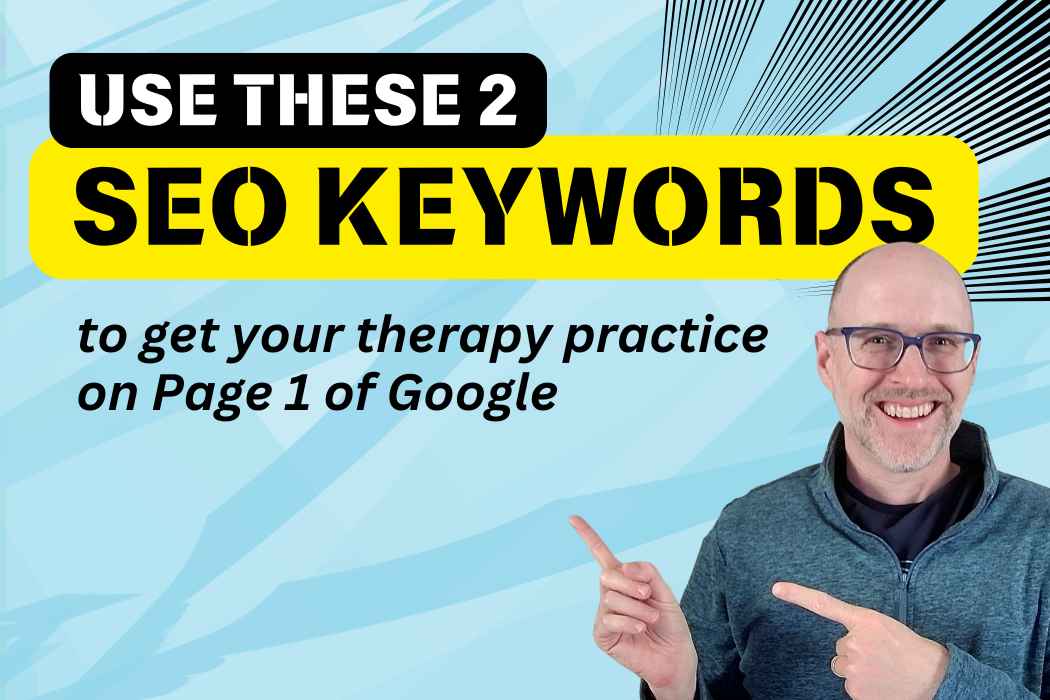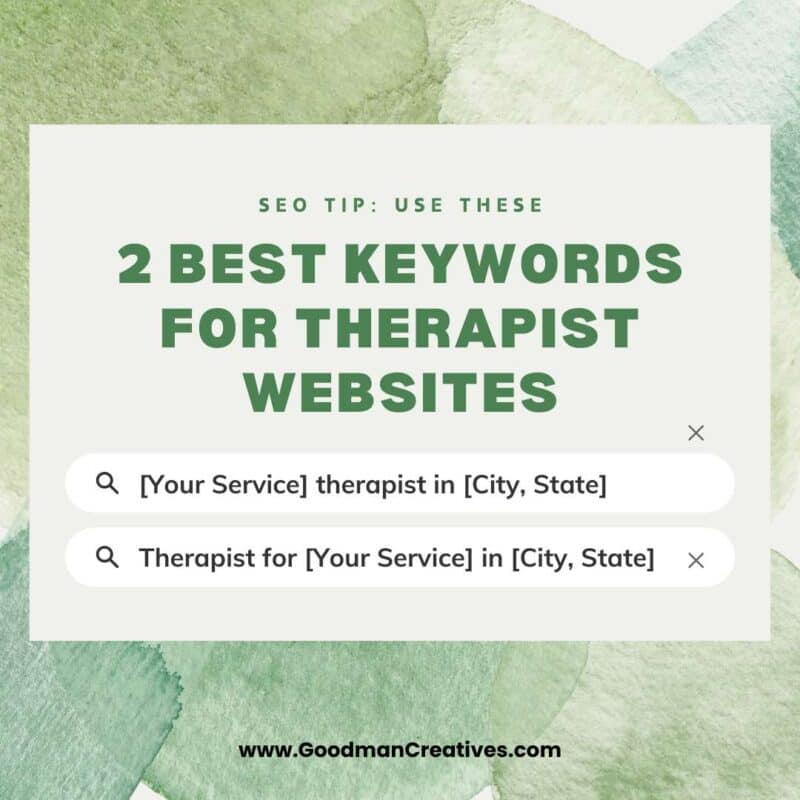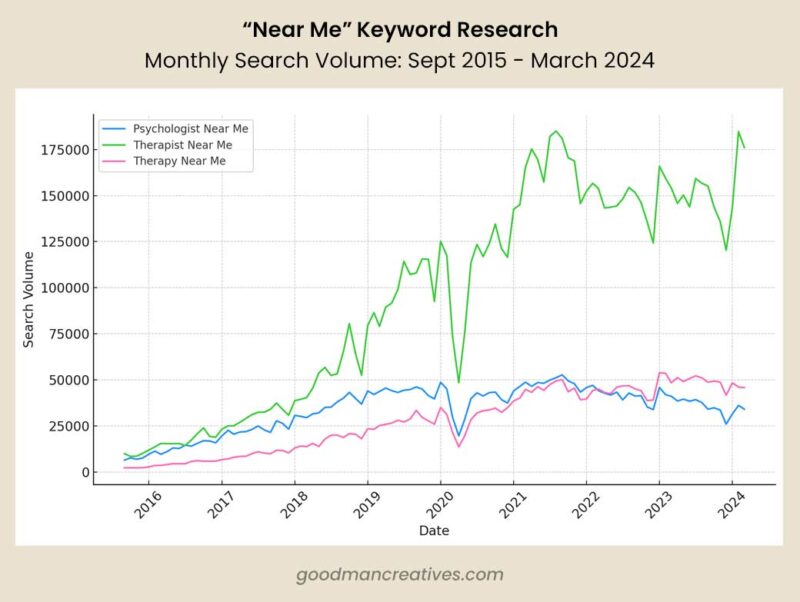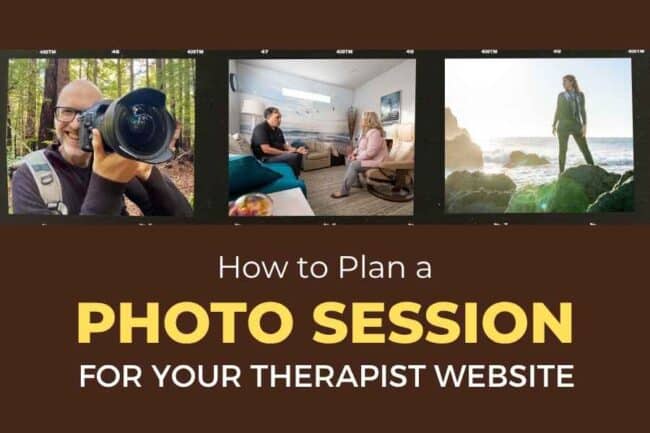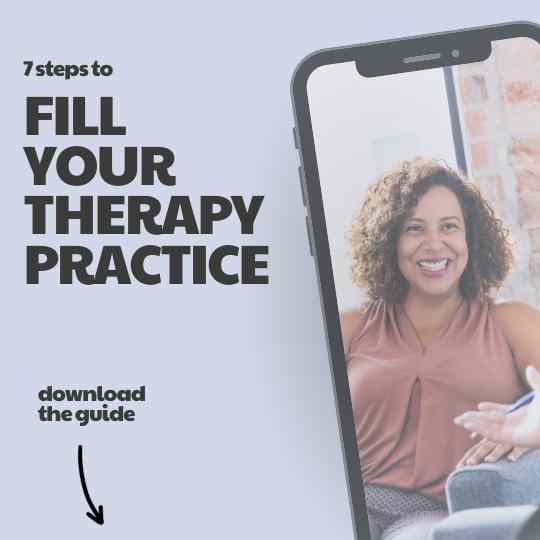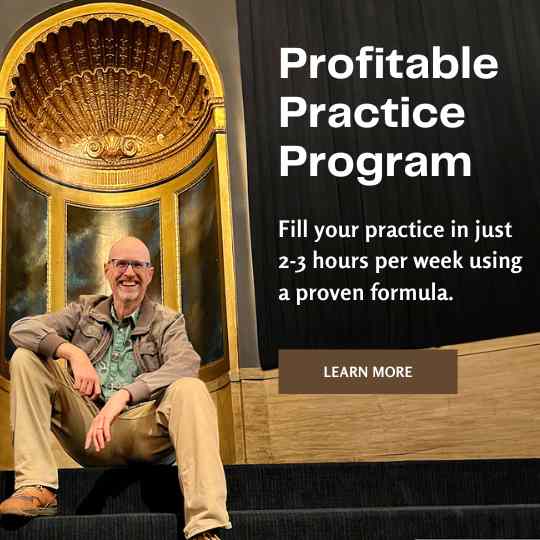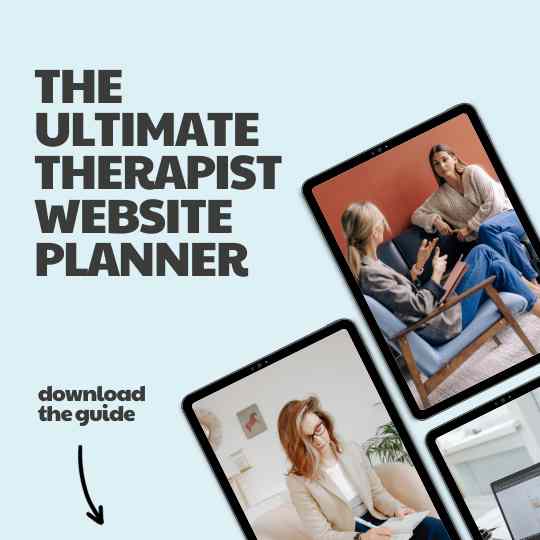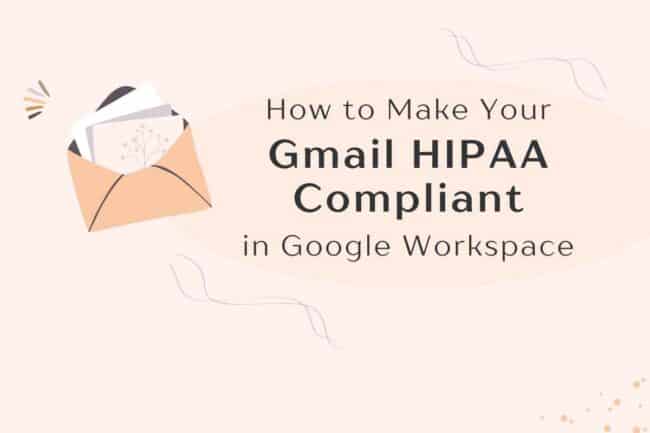Ever wonder what primary keywords you need to use to get your therapist website on page 1 of Google?
I’m going to let you in on a little secret …
No matter where your practice is located or what your niche is, the best primary keywords almost always come down to one of two variations:
- [Your Service] therapist in [City, State]
- Therapist for [Your Service] in [City, State]
For example, if you’re a therapist in Denver specializing in anxiety, your primary keyword should be “anxiety therapist Denver CO” or “therapist for anxiety Denver, CO.
Other variations, like “anxiety therapy,” “CBT for anxiety,” or “get help with anxiety,” just don’t work as effectively. They don’t tell Google exactly what your page is about.
This isn’t just an assumption.
Over the past 18 years, I’ve researched and analyzed thousands of keywords for therapists, and the data always points back to these results.
Now that you know the big secret …
… the question becomes: how do you use these magic keywords? Let’s find out.
1. Your H1 Tag Should Be Your Primary Keyword
Your H1 tag is one of the most important elements on your webpage when it comes to SEO for therapists. It stands for “Heading 1” and is the main headline of your page. Think of it as the title of a book—it should give Google and your visitors a clear understanding of what the page is all about.
Search engines like Google rely on H1 tags to understand the topic and purpose of your page. This means your H1 tag should be highly focused, using your primary keyword to tell Google exactly what you’re trying to rank for.
For example, if your page is about anxiety treatment in Denver, your H1 should be something like: “Anxiety Therapist in Denver, CO”
Many therapists make the mistake of using vague, inspirational, or overly long H1 tags—like “Welcome to My Practice” or “Helping You Find Peace and Calm.” While these are great for conveying warmth and personality, they don’t tell Google what your page is about, and they’re not helping your SEO. Your H1 tag should be clear, simple, and keyword-focused.
POWER TIP — You should only have one H1 tag per page.
Think of it like this: Google needs to know the single most important topic of the page, and multiple H1s can create confusion.
If you’re using website builders like Squarespace, Wix, or Weebly, be careful! I regularly see therapist websites with 2+ H1 tags on a webpage. When I ask them why, the answer is usually some variant of “it was the biggest font they would let me use and I wanted the text to stand out.” From a design perspective, this makes sense. But from a therapist SEO perspective, it’s a disaster.
2. Your Page URL Should Match Your Primary Keyword
Google uses URLs as a ranking signal (they even say so on their official SEO documentation). A clear, keyword-focused URL tells search engines exactly what the page is about, improving your chances of ranking higher. Even though people rarely type URLs directly (usually coming from Google or a link on your website), a well-structured URL helps both search engines and users understand the page’s relevance.
When creating your UR for your therapist websiteL, don’t worry about length. Instead, the URL should exactly match your primary keyword. Here’s an example using “anxiety therapist Denver CO.”
- GOOD:
www.yourtherapistwebsite.com/anxiety-therapist-denver-co - BAD
www.yourtherapistwebsite.com/anxiety
Power Tip — Avoid Over-Organizing Your URLs
While it might seem logical to create a neat folder structure for your website, placing important service pages under a central directory like /services/ can actually hurt your SEO. This is because Google sees URLs as a signal of importance.
If your most important pages are buried under multiple levels, Google assumes they’re less significant, and they won’t rank as highly in search results. Let’s continue using our anxiety therapist Denver, CO example:
- GOOD:
www.yourtherapistwebsite.com/anxiety-therapist-denver-co - BAD
www.yourtherapistwebsite.com/services/anxiety-therapist-denver-co
4. Use Your Primary Keyword 4-5 Times in Your Content
It’s not enough to just put your primary keyword in your H1 at the top of the page. You need to repeat it to show Google you mean business. But, there’s a delicate balance between appeasing the robots and creating authentic copy that attracts your dream therapy client.
In traditional SEO, primary keywords should appear 4-5 times per 500-words.
This count is called keyword density, which refers to how often your keyword appears compared to the total word count. A good rule of thumb is to aim for a 1-2% density.
However, repeating an awkward phrase like “anxiety therapist Denver CO” 15 times in longer content can feel unnatural and forced. Plus, overuse (aka keyword stuffing) can hurt your rankings, so prioritize quality and readability over repetition. Remember, no one wants to reach out to a therapist when their website copy sounds forced, robotic, and spammy.
Here are a few ways to get your primary keyword into your content without being obnoxious.
- Subheading (H2 or H3): Use it once more in a subheading.
- First 100 words: Try to include your primary keyword near the beginning of your content, ideally in the first sentence or paragraph.
- Use throughout the middle content: Aim for 2-3 times depending on the length of the page.
- Last 100 words: A call to action is a great place to put it. For example, “If you’re seeking an anxiety therapist in Denver, CO, I invite you to reach out and start your journey toward healing.”
- Image alt tags: Include your primary keyword in the alt text of one or more images to give search engines extra context.
5. Use Variants as Secondary Keywords in Your Copy
While your primary keyword tells Google exactly what your page is about, keyword variants help Google show your page for more search queries. Similar to the primary keyword, there are some definite trends that my extensive keyword research has shown. Here are some good starting points:
- Therapist for [Your Issue] near me
(e.g., “Therapist for anxiety near me”) - Best therapist for [Your Issue] in [City]
(e.g., “Best therapist for anxiety in Denver”) - Counseling for [Your Issue] in [City]
(e.g., “Counseling for anxiety in Denver”) - [Your Issue] psychologist in [City]
(e.g., “Anxiety psychologist in Denver”) - Therapy for [Your Issue]
(e.g., “Therapy for anxiety”)
5A. My Thoughts on “Near Me” Keywords
My research showed that “near me” searches, such as “anxiety therapist near me,” almost always have the highest search volume for any geographic area. However, optimizing your entire page for “near me” is often forced and unnatural. It also doesn’t clearly indicate to Google where your practice is located, which is one of the main purposes of using city-specific keywords.
5B. Therapist vs Therapy Keywords
If you’re wondering why my primary keyword recommendations all use the word therapist and not therapy …
People who are seriously looking for help tend to search for “therapist” rather than “therapy.” It’s action-oriented and matches their intention of finding a provider. Those searching for “therapy” are often just researching. If you’re curious to learn more, you can check out my deep dive into therapist SEO data, where I set out to find out why your therapy practice is slower than last year.
6. Build Internal Links With Your Primary Keyword
Internal links are a powerful SEO tool that helps Google understand the structure of your site and boosts the ranking of your key pages. By linking to other important pages using keyword-rich anchor text (like “anxiety therapist in Denver, CO”), you signal to Google what each page is about.
And yes, it might feel unnatural to include a phrase like “anxiety therapist in Denver CO” on your depression therapy page. However, if you can work it in naturally, linking that phrase to your anxiety therapy page can significantly reinforce the keyword for Google. This tells search engines that the linked page is highly relevant for those terms, boosting your SEO.
Looking at the Big SEO Picture
No matter your city or niche, the key to standing out in a competitive space is by focusing on targeted primary keywords like “anxiety therapist in [City, State]” and pairing them with well-chosen secondary keywords. These specific phrases tell Google exactly what you do and where you’re located, improving your chances of ranking higher in search results.
That said, it’s important to be realistic—there are no guarantees. Competing with giants like Psychology Today, Zocdoc, and Yelp makes it tough to crack page 1 of Google. However, by focusing on highly specific keywords that tell Google exactly where you are and what you do, you significantly improve your chances of being noticed. While it may not happen overnight, using these strategies to build a strong SEO foundation will give you a better shot at ranking in the top 10 for the searches that matter most to your practice.
SEO is a long-term game, but with the right approach, you’re setting yourself up for better visibility and sustainable success. After working with therapists for 18 years and conducting thousands of hours of research, I can tell you that this is the path to build a thriving practice online — one keyword at a time. And if you’re ever feeling stuck, remember that even cats don’t catch the mouse on the first try — but they always keep at it.
— Greg Goodman

